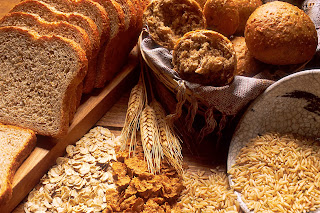This
article discussed the importance of covertly installing the right types of
nutrients into your diet. From top online personal trainer, Brodie Mangan,
understand the impact grains have on your health and exercise success. For more
information, meal plans, and exercise programmes visit brodiept.com.
Traditional diet advice
tells you to make half your grains whole grain, in fact the food pyramid tells
you most your calorie intake should be from carbohydrate based foods. While
there are some great nutrients in these foods, the harmful effects grains have
on your body far outweigh any nutritional benefits. So why have these foods
been pushed on to your plate over the past four decades? It began when studies
were showing individuals were not getting enough fibre in their diet, and as
recently as 2012, studies still confirm this fact. (1) The problem is many
people look to grains to fill their fibre needs when there are actually healthier,
less toxic, foods that can do this for you. So why do you have it entrenched in
your brain that grains are an essential part of the diet? First off, they are
readily accessible in most western societies and can be made quickly and
cheaply. This means there are a lot of company pounds well more dollars since
they’re mainly American owned, supporting “research” and “recommendations” that
have made their way into a more global state of mind.
Why
Should I Avoid Grains?
Weight gain, decreased
heart health, and increased inflammation are just a few major reasons grains
have a negative impact on your health. This purpose of this article isn’t to
have you entirely avoid an entire food group, however, changing the way you
think about grains and replacing these choices with healthier options.
Grains and Weight Gain
As an online personal
trainer, I get tons of questions about carbs and while the issue is complex the
bottom line is people simply eat too much of these foods, it’s really that plain
and simple! One study found that individuals who have a grain-focused diet eat
400 extra calories per day! That may not seem like a lot, but ponder for a
moment that if you consume these extra calories for an entire year you could
end up 40 pounds heavier! Don’t think it can happen? I’ve seen cases off weight
gain of 7-9 stone in half that time in years.
The body reacts to
carbohydrates like no other nutrient.
When fat and protein hit the blood stream they are put to use. Protein that is
not needed by the body is then excreted as waste, while extra fat may be stored
but also functions to provide insulation, cushion and protect the organs, act
as a secondary source of energy, and transports vitamins A, D, E and K. Pretty
important stuff! (6) Carbohydrates act totally different. When carbs hit the
digestive tract they are converted into glucose. Glucose does play an important
role in the body by providing energy to the brain and muscles. The problem is
the body doesn’t need nearly as must as we supply it and the rest is stored.
Some is stored in the muscle and liver, but if they’re full and if you don’t exercise
they’re likely to be, the rest makes its way into little cells known as fat,
which turn into big cells!
Carbohydrates also
impact the amount of sugar, or glucose, in your blood stream. This can start
the hunger cycle. It begins with breakfast. Your body has been fasting for over
8 hours, so it’s natural to feel hungry. You reach for cereal and a flavored
coffee, both containing carbohydrates and very little protein. When those
substances hit the intestines the carbs are converted to glucose and send your
blood sugars rocketing upwards. For a while you feel a burst of energy, but
quickly those sugars are metabolized and you are left feeling tired and hungry
– even though you've had plenty of calories for your morning meal. You wait out
the hunger until lunch, by then you are famished and your blood sugar shave
dipped low making you feel lethargic. You chow down on the easiest foods available,
usually a sandwich and chocolate bar or similar and again sending your glucose
high. About two hours later you hit the same low of hunger and fatigue. Instead
of waiting for dinner you reach for the sweets or crisps in your bag and the roller coaster ride begins again. When we continue this cycle every day you are cramming your body full of carbs, sugar, and low-nutrient foods eventually
leading to weight gain, unstable insulin levels, and a myriad of other health
problems.

Grains and Heart Health
Fibre itself is
correlated with improved heart health for its ability to lower LDL cholesterol
levels, generally accepted as bad cholesterol, but it still has a role!
However, cholesterol levels in general are not completely to blame for the rise
in heart disease and other chronic diseases. In fact, the underlying issue may
just be grains. People who consume a large amount of grains, especially refined
grains, tend to have high triglyceride levels. Triglycerides have long been
linked to cardiovascular disease, however, only recently have scientists
realized this level is more telling of heart health than other cholesterol
levels. (5) The surprising thing is that triglycerides have nothing to do with
fat in the diet and everything to do with carbohydrates. Low protein intake and
high carb intake is the reason triglyceride levels are elevated. (7)
Compounding the
triglyceride effect, diets high in wheat have been linked to weight gain,
particularly around the belly. Weight around the mid-section is always a
concern. This usually stems from cosmetic view-point, but there are many health
concerns that relate to extra pounds around the waist. If an individual carries
excess weight around their mid-section they are typically referred to as an
“apple” body type. Clinically this is referred to as central obesity.
Belly fat is serious and
increases your risk for many health problems. There is a strong correlation
between central obesity and diabetes, heart disease, high blood pressure and
stroke. (3) Even if you are in a normal
weight range (based on your BMI), you may have excess belly fat and increase
your risk of these same diseases. One reason belly fat is of such concern is
because of the visceral fat that is often also present. Visceral fat is also
known as intra-abdominal fat and is packed between internal organs within the
mid-section. This type of fat creates the “pot belly” or “beer belly” look.
Belly fat is unique
because it does not just lay dormant, taking up extra space and making your
next shopping trip frustrating. Instead hormones and inflammatory substances
are secreted from this fat. This happens because it is widely believed that
abdominal fat breaks down easily into fatty acids that have easy access to the
liver through the portal vein. With the influx of these fatty acids into the
liver more LDL (bad) cholesterol is created, along with excessive
triglycerides. Both these substances have negative effects on heart health. (4)
Another interesting side
effect of excessive visceral fat is the presence of fatty liver. This happens
because of the fatty acids delivered to the liver that are then stored at fat.
When this shift in the
blood chemistry happens, it also can impact insulin production and hormone
balance. This phenomenon is often referred to as metabolic syndrome. According
to the Mayo Clinic, metabolic syndrome is a cluster of increased blood
pressure, a high blood sugar level, and abnormal cholesterol levels. All
increase your risk of heart disease, stroke and diabetes.
The
Inflammation & Carb Connection
Grains contain gluten and lectin.
Gluten is a substance found most grains and gives dough its elastic texture. When
someone with gluten sensitivity eats grains causes an inflammatory response in
the gut leadings to discomfort and malabsorption of all nutrients. Typically
this leads to diarrhea, gas, bloating, and sometimes a rash. If the
inflammation continues overtime the person may experience dramatic weight loss
and nutrient deficiencies and can cause the person to be very sick. (2) This is just one of the ways grains can lead
to inflammation in the body, which will inhibit your weight loss and exercise
performance. If you think you may be sensitive to this nutrient Brodie Mangan
can create a meal plan that is just right for you, meeting your nutritional
needs to succeed.
Lectin is a whole other
issue, and it affects everyone.
Unbeknownst to most, lectin is everywhere! This low grade toxin is essentially
carb-binding proteins act to protect the grain from predators. However, what
was once intended to preserve the species and keep them healthy now cause
problems for our bodies. A certain amount of lectin in your diet are
unavoidable and are found, most notably, grains, legumes, eggplants, tomatoes,
potatoes, and peppers. The problem becomes that we simply eat too much of these
foods, especially grains. So what’s the big deal? Lectin can damage the
intestines inhibiting absorption of important nutrients. Overall, they are bad
news and weeding out the foods that are most offensive is a good way to improve
your gut health.
You can’t talk about
grains without talking about phytic acids. While not a common dinner
conversation, these acids are a major storage compound of phosphorus found in
seeds and cereal grains. Binding metal ions it it’s job (mainly zinc, calcium
and iron) and can actually block the intestines ability to absorb these
minerals. (8) Grains with the highest
amount of phytic acid include:
·
Barley
cereal
·
Wheat
Bran
·
Mixed
grain cereal
Should
I Avoid All Carbs and Fiber?
No. The body prefers
carbs as a primary source of fuel for the brain and muscles. If you completely
cut out carbs you are in for a rocky road. When consuming extremely low amounts
of carbs the body starts to shut down and you will feel constipated, fatigued,
moody, and maybe hungry. This does not mean turning to refined carbs or sugary
treats, you must be mindful of the types of carbs you are eating.
Grains and ingredients to
avoid include:
·
Processed
dough (pizza, cookie, bread, rolls, etc.
·
White
bread
·
White
rice
·
Sugary foods (chocolate bars, fizzy
drinks, etc.
·
brown
sugar
·
corn
sweetener
·
corn
syrup
·
dextrose
·
fructose
·
fruit
juice concentrate
·
glucose
·
high-fructose
corn syrup
·
honey
·
lactose
·
maltose
·
malt
syrup
·
molasses
·
raw
sugar
·
sucrose
·
sugar
What
about Fiber?
Fiber
is an exception and should be covertly installed in your lifestyle. It is put
together in such a way that it can’t be broken down into sugar molecules, and
so it passes through the body undigested. Fiber comes in two varieties: soluble
fiber dissolves in water, while insoluble fiber does not. Although neither type
nourishes the body, they promote health in many ways. (6) Meeting the recommended 25 to 35 grams
of fiber daily will balance the body and can be healthy when you get them from
the right sources. Some great choices when it comes to carbs and fiber include:
·
Beans
(white, black, pink, kidney, lentil, almond, walnut, chickpea)
·
Small
seeds (sunflower, flax, pumpkin, poppy, sesame)
·
Whole
grains (drum, spelt, kamut, wheat, millet,, rye, barley)
·
Vegetables
(avoid starchy vegetables such as corn, peas, and potatoes)
·
Fruits
(peaches, strawberries, the crunchier the better)
The Bottom Line:
Understand grains are not your friend when it comes to reaching your physical
best. Focus on lean protein, fresh fruits and vegetables for a balanced diet.
For more meal plans and ideas from Brodie Mangan, visit brodiept.com.

References:
(2) http://www.oxforddictionaries.com/us/definition/american_english/gluten & http://www.fda.gov/forconsumers/consumerupdates/ucm363069.htm


.jpg)












.jpg)



.JPG)









